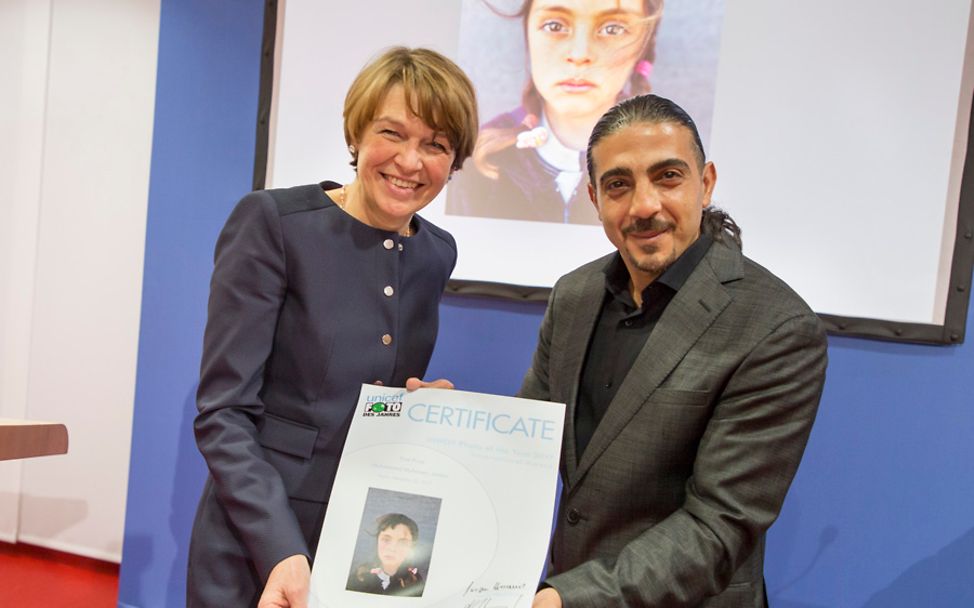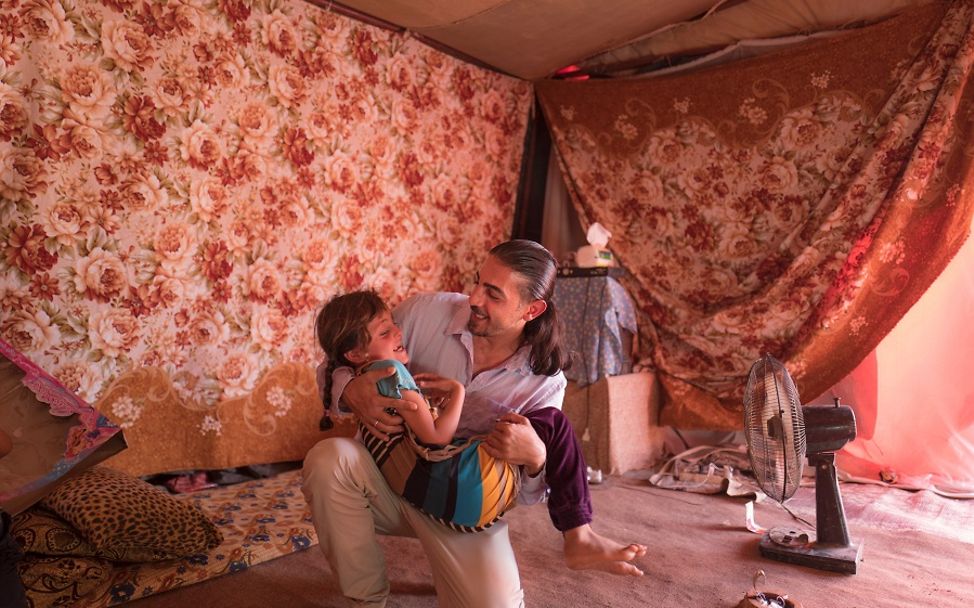The face of a tormented childhood
This year's UNICEF Photo of the Year is captured by two-time Pulitzer Prize-winning photojournalist Muhammed Muheisen. Zahra - the then only five-year-old Syrian girl on the winning picture, lives with her parents in an informal tented settlement in Jordan.
For over a decade Muheisen has been documenting stories of refugees and internally displaced people around the world. He met Zahra and her family for the first time in 2015 and captured this winning picture in 2016 while working on a photo series ahead of the sixth anniversary of the Syrian civil war. "For me it is so important to focus on the most vulnerable ones, the children, and to tell their stories to the world," explains the award winner in Berlin.

Photo journalist Muhammed Muheisen together with Elke Büdenbender, patroness of UNICEF Germany, at the award ceremony in Berlin.
© UNICEF DT/Maurice ResselI met him shortly before Christmas at the official award ceremony in Berlin and asked him a few questions about his work and about Zahra.
UNICEF Photo of the Year: Interview with this year's award winner
Dear Muhammed, once again congratulations on this great photo and congratulations on the award! As a long-time photojournalist, what does reportage photography mean to you?
First of all, photography is my passion and journalism is my education and both together made me a well aware photojournalist of what is happening in the world. There are so many stories haven’t been told and I find it my responsibility as a photojournalist to be out there and tell these stories, as I believe if something happened and it had never been documented simply it is like it never occurred. Through my photography I aim to raise awareness, to create an echo and carry the voices of the people that I photograph to the world and do my best to make it heard.
How did you come to photography?
It all started when I was a kid specifically the moment I met my grandma’s Polaroid, this small machine when you look in the viewer and then press the button, that exact moment gets documented on a piece of paper that we carry with us all our lives, since then I realized my love and passion for photography and to document moments and make sure that it gets carried to the coming generations and for that I decided to study journalism to combine both my passion and my education and aim to be a storyteller who searches for important stories to tell.
What was the most formative photo reportage you did?
To be honest with you, I value every image that I photograph, especially it is not about me it is about the people that I photograph, so every image that I capture has an important story and a special value to my heart as I believe the people trusted me to portray them and the least I can do is make sure that their voice is heard and their stories are delivered to the world.

Muhammed Muheisen - winner of the UNICEF Photo of the Year - and Zahra play in a tent in a Jordanian refugee camp.
© Rosanna WijngaardsWhat is the story of Zahra - the Syrian girl on your winning picture?
I met Zahra and her family for the first time in August 2015 in an informal tented settlement in Jordan a few months after they fled their home from Syria. Back then I was traveling around to document images showing the daily lives of the Syrian refugees, so I used to walk around the camps trying to show a window into the daily lives of the Syrian refugees, the difficulties and their daily struggle and challenges and there is no better way to show that than spending a lot of time, become part of the landscape and become invisible simply to earn the peoples trust.
One day I saw a quiet and beautiful girl whom I approached and spoke to and to her parents whom I photographed the same day. As I always do, I stayed in touch with the family and returned back in 2016 to photograph her again and that was when I captured the winning image of Zahra. Up-to-date we are in contact and I recently visited Zahra and her family in the Jordan Valley. It is part of what I usually do, is to remain in touch with the people that I meet and photograph.
How is Zahra and her family? Do they still live in the refugee camp in Jordan?
Zahra and her family arrived to Jordan in April 2015 and few months after they took shelter in an informal tented settlement where I met them. Currently, Zahra’ s father Hassan, works in a nearby farm. It was in early November 2017 that I visited them last. Unfortunately, not much has changed for the family since we first met in 2015. Zahra and her siblings still don’t go to school as her parents can’t afford financially to send them to school, they are still all living in a tent. Zahra's mother said to me, "We are desperate, hopeless and powerless, all our dreams are just dreams."
Your relationship with Zahra seems to be very intimate, friendly. Is it difficult for you to photograph children in such situations?
I always focus in my photography on children as I personally believe that children are the real victim of conflicts, children don’t get to choose where they are born or under what circumstances they grow up and all children around the world seek one thing in common, fun, joy and happiness and for me it is not just a picture of a child it is a message from a child from that part of the world to a child in the other part of the world!